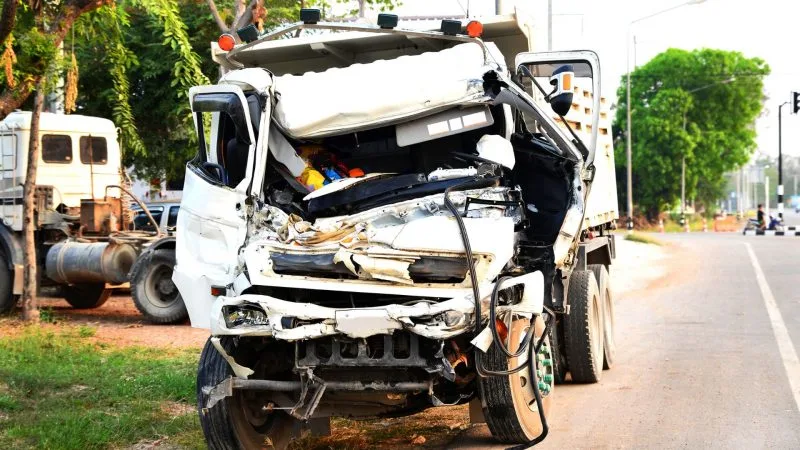While safely maneuvering a large commercial truck can be difficult, this is not an excuse for truck drivers to put other people in harm’s way. This applies when truck...
Read more
How Negligence Is Established in a Truck Accident
If you or your loved one has been in a truck accident, we know these are challenging times for you. You may be entitled to compensation. To recover compensation, you must prove that the accident was the fault of another party. You can prove fault under the law of truck accident negligence.
Negligence is established by proving four elements: duty, breach, causation, and damages. It can be hard to establish negligence, especially if multiple parties are involved in the truck accident. A Board-certified truck accident lawyer can help explain how negligence is established in a truck accident. It is best to hire a Board-certified truck accident attorneys with experience to build your negligence case and get you the compensation you deserve.Contact us today at 503-222-6333 to discuss your case and learn how we can help you.
Elements Required to Establish Negligence
Negligence is a breach of a duty of care that causes harm. A truck accident claim is based on the law of negligence. You must prove the four elements to successfully make a negligence claim.
Duty
For any negligence claim, the plaintiff must show that the defendant owed the plaintiff a duty of care. This duty of care refers to ordinary care that a reasonable person would exercise in a similar situation. In the context of driving, this element is generally simple to prove. Every driver on the road has the duty to drive safely and competently to protect other drivers, cyclists, and pedestrians. Therefore, a truck driver owes a duty of care to drive safely.
Let’s Get in Touch Today!
D’Amore Law Group has four convenient locations in Oregon and Washington.
Breach
The next element you must prove is a breach of duty. The defendant must do something to violate the duty they owed. For example, if a truck driver ran a red light or drove while under the influence of alcohol, they breached their duty to drive safely on the road.
Causation
The third element of negligence is causation. You must show a direct causal relationship between the breach of duty and the accident and injuries suffered. It is not enough that the duty was breached. You must show that the breach caused the damages. For example, it is not enough that the truck driver breached their duty to drive safely by driving under the influence of alcohol. You must show it was the truck driver’s impairment from the alcohol that caused your accident and injuries.
Damages
The last element to prove is damages. You must have suffered some damage from the negligent act. This can include physical, emotional, and psychological injuries. Loss of income and property damage are also examples of damages.
Possible Negligent Parties
There are multiple parties you may be able to sue in a truck accident negligence lawsuit, depending on the facts of your case.
Truck Driver
Truck drivers can be negligent by violating their duty to drive safely on the road. They can breach their duty with acts like the following:
- Driving while fatigued,
- Failing to follow traffic laws,
- Failing to brake,
- Driving under the influence, and
- Driving while distracted.
Typically, an insurance company will pay claims based on the truck driver’s negligence.
Truck Company
If the truck driver is an employee, then the truck company can be vicariously liable for its employee’s actions. Truck companies can also have the following duties:
- Duty to hire drivers who know how to drive a truck;
- Dut to provide sufficient job training for the drivers;
- Duty to ensure truck weight does not exceed its max load;
- Duty to perform background checks on employees to ensure that they do not have a bad driving history; and
- Duty to ensure that trucks receive regularly scheduled maintenance.
If a truck company breaches these duties and that breach causes a truck accident and damages, it can be held directly liable.
Truck Manufacturing Companies
An error or problem in the manufacturing process can cause a truck accident. Manufacturers of trucks and truck parts have a duty to build products that are safe. If the design or manufacturing process is unsafe or defective, then the responsible parties can be held liable for resulting injuries. These are usually strict liability claims, which means you do not have to prove negligence; you just need to prove that the product was unsafe and caused injury.
Cargo Loader
A cargo loader has a duty to ensure that a truck’s cargo is secured and properly loaded into the truck. For example, suppose a cargo of logs is improperly tied onto the truck, so the logs fall into oncoming traffic. The cargo loader is liable for injuries caused by the falling logs. The cargo loader breached its duty when it did not properly secure the logs onto the truck.
Truck Maintenance Company
Trucks must be maintained regularly to ensure there are no issues and that the truck can run effectively and safely. Examples include the following:
- There are no fuel leaks;
- There are no brake issues;
- The engine runs smoothly; and
- The tire pressure is sufficient.
If the truck maintenance company fails to detect a problem it reasonably should have caught during scheduled maintenance, then it has breached its duty. If this defect or problem caused your injuries in the accident, then the truck maintenance company can be liable for negligence.
Government
Governments can also be liable for a truck accident. Generally, a city or local government must maintain its roads, infrastructure, and traffic signs. Federal and state governments may also have these duties and maintain federal and state highways. If anything has a defect, then the government may be liable. For example, suppose a city government is responsible for ensuring traffic lights are in working order, but a traffic light is broken down. If a truck runs the light and causes injuries, the government can be liable because it breached its duty to maintain the traffic lights.
Keep in mind, however, that claims against the government can involve special rules, and the government is immune from liability on certain claims. It’s important to consult with certified truck accident attorneys to understand how to bring a claim against a government entity.
Types of Truck Accidents Negligence
Not every state has the same negligence laws. D’Amore Law Group has offices in Washington State and Oregon. While proving the four elements of negligence are basically the same from state to state, determining fault and compensation can be different.
Washington
The State of Washington is a pure comparative fault state. This means both parties can be responsible for the accident. However, that does not bar recovery. Under pure comparative negligence, you cannot recover damages for the portion of the accident you were responsible for.
For example, suppose you were speeding and a truck ran a red light because the driver was on their cell phone. You were found to be 20% at fault for the accident, and the truck driver was 80% at fault. You suffered $200,000 in damages. You can recover only 80% of the damages ($160,000). You cannot recover the other 20% of the damages ($40,000) because you were at fault.
Oregon
Oregon is a modified comparative negligence state. This is different from Washington’s pure comparative negligence. Under modified comparative negligence, you cannot recover damages at all if your share of fault is more than 50%. If you are 50% or more at fault, your damages will be reduced by the percentage you are at fault.
For example, suppose you ran a red light, and the truck driver was under the influence of alcohol. You were found to be 40% at fault, and the truck driver is 60% at fault. The damages are $100,000. You can only recover 60% of the damages ($60,000). You cannot recover the other 40% of the damages ($40,000) because you were at fault.
Alternatively, if you were 60% at fault and the truck driver was 40% at fault, you cannot recover any damages because your fault is greater than the truck driver’s fault.
How Long Do I Have to Bring a Truck Accident Negligence Claim?
The time you have to bring any claim is called the statute of limitations. Every claim has a statute of limitations, though the time limit varies based on the type of claim and the jurisdiction. Once the statute of limitations expires, you will be barred from pursuing the claim. A court will dismiss your case if you attempt to file a claim past the deadline.
The reason the statute of limitations exists is to ensure cases that are litigated are recent. As time passes, memories fade and evidence is lost. It is unfair to litigate a case after an extended period of time has passed.
Truck accident claims fall under personal injury law. Washington and Oregon have their set statute of limitations for personal injury.
- In Washington, a plaintiff has three years to bring a personal injury claim.
- In Oregon, a plaintiff has two years to bring a personal injury claim.
Contact a certified truck accident attorney to ensure you do not miss your deadline to recover compensation.
Contact D’Amore Law Group
You don’t have to face the aftermath of a truck accident alone. Our experienced legal team at D’Amore Law Group will stand by your side. We will help gather the evidence, negotiate with ruthless insurance companies, and represent you at trial if necessary. Money can’t reverse the damage done or heal your injuries. But it can help lessen the financial nightmare you and your family have been in since the accident.
D’Amore Law Group has been a pillar of the community for almost three decades, and Tom D’Amore is one on the few attorneys in the country to receive a truck accident law certification through the National Board of Trial Advocacy. Contact us now for a free case evaluation. We get no fee unless we win, so don’t wait.
